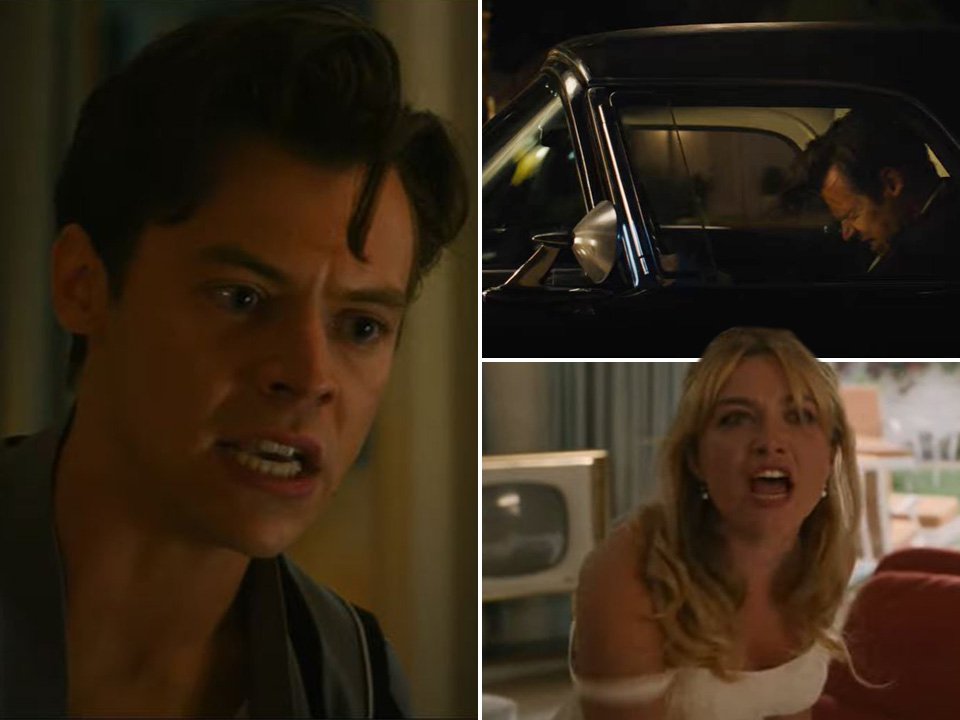
I’ve always held a torch for .
As a fellow North-Westerner, it’s been a joy to watch him ascend from humble beginnings as an X-factor contestant, to global boyband sensation, breakout solo performer and bona fide Hollywood actor.
He’s one of the most famous and culturally influential people on the planet, and as such, is open to a fair amount of criticism. But not all criticism is fair.
Some conservative commentators have obsessively demanded he open up about his sexuality, twisting their knickers over a man who is comfortable in expressing his masculinity, femininity and all that lies in between.
But Harry has faced a new category of critique this week. A clip of his upcoming movie ‘’ was released on Twitter, showing a 20 second sneak-peak of Styles’ performance opposite Florence Pugh.
Alongside the usual ‘can’t wait to see this/couldn’t pay me to see this’ comments, people reacted strongly to Harry’s accent.
It was mocked and ridiculed, with comments including: ‘Is this his real voice?’, ‘What is this accent?’ and ‘How many accents can one man do in 26 seconds?’.
As previously discussed, Harry Styles is a global superstar millionaire, he isn’t oppressed, and he’ll do just fine no matter what we think of his on-screen performance.
But if the internet is mocking a northern accent simply for being a northern accent, then you can bet I’ll address it.
Fans of his jumped to Harry’s defence, suggesting his transatlantic lifestyle might be the reason his character’s voice sounded strange, and it struck me as comical that people would jump to such a conclusion.
To me, Harry sounded like every voice I grew up with. As a northerner, I recognise his North-West English dialect.
And as an actress, I recognise what it’s like to be told that your native accent is ‘wrong’.
There were several times during my drama school training that I was told my northern accent wasn’t good enough. The only thing ‘wrong’ was our teachers’ presumption that anyone from the North should sound like a member of Oasis, Sean Bean or Victoria Wood.
Despite having a decent-sized cohort of northerners in my year, some teachers deemed our accents appropriate only for comedy roles, baddies or improvisations centred on making cups of tea.
But it isn’t just teachers at a West-London drama school who think this way.
For decades, northern characters on the small screen have been victim to stereotype, ridicule and appropriation.
We’re the shameless reprobates, or the inspirational salt-of-the-earth working-class heroes, but it’s rare that a northern accent is represented outside of a lower-class stereotype.
In Hollywood, it’s barely represented at all, which is why it was refreshing to hear my own dialect in a clip from a Warner Bros release.
When I heard Styles – a northern actor speaking in northern tongue on a Hollywood screen – it was music to my ears
The global film audience – largely influenced by American cinema – have long been exposed to a posh version of the British accent: Received Pronunciation, or ‘RP’, but anyone from Britain knows we don’t all speak like the cast of Downton Abbey.
We might be a small island, but our accents range far and wide. We’re one of the most culturally diverse countries in the world and our accents are formed from a multitude of influences – race, class, nationality, geography and cultural background.
We’re not divided into Julie Andrews’ and Dick Van Dykes from Mary Poppins – and it’s worth pointing out that no one, ever, in the history of the UK has spoken like Van Dykes’ ‘Bert’.
For years, we northerners have endured accent butchery from actors who clearly aren’t from t’North.
When attempted the Yorkshire dialect in ‘One Day’ – my brain broke.
When I heard Styles – a northern actor speaking in northern tongue on a Hollywood screen – it was music to my ears.
I’m not saying that characters can only be played by actors who were born and raised in the same hometown.
But if that place, that accent, is under-represented in popular culture the very least the actor cast in the role can do is get the vowel sounds right and avoid resorting to stereotypes.
Don’t be a Dick Van Dyke.
I hope that Styles’ casting normalises North-West accents in popular culture, and that audiences grow to accept a wide variety of diverse British accents – perhaps it will encourage the casting of lesser-known northerners in breakout roles.
But for now, those mocking Styles for speaking in his mother-tongue could do with heeding the advice of the film’s title – don’t worry darling.
Do you have a story you’d like to share? Get in touch by emailing [email protected].
Share your views in the comments below.




















